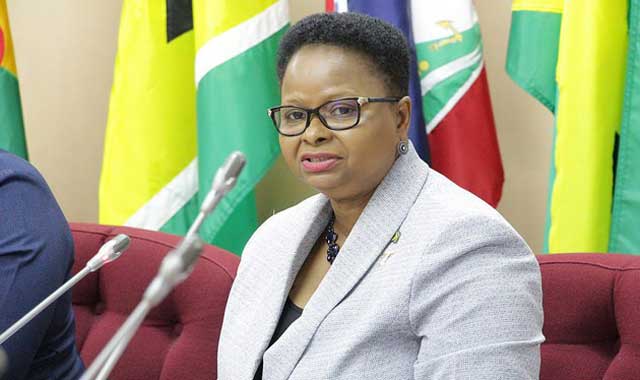A call for urgent action to address the migration of nurses and midwives from the the CARICOM region was made during the opening of the 45th Annual General Meeting of the Regional Nursing Body (RNB) on Teusday, at the headquarters of CARICOM, in Guyana.
It included recommendations for strong advocacy for the implementation of the 2001 Migration Strategy and for a statement to be issued by the RNB to the leadership of the Community’s highest decision-making body.
Chair of the RNB, Nester Edwards, chief nursing officer, Grenada, told the gathering of chief nursing officers, representatives of nursing councils, universities and international development partners that “experienced nurses are leaving in large numbers”.
“Chief Nursing Officers can testify to a certain renewed active migration taking place where international agencies are coming in a secretive manner and recruiting our personnel,” she said.
“We need to bring this issue back to the table and talk about implementing those strategies.”
Guyana’s Minister for Public Health, Volda Lawrence, who also addressed the official opening, underscored the urgent need for a comprehensive human resource strategy that will boost the present workforce and prioritise the improvement of nursing education in keeping with current trends and best practices in the field.
In similar vein, she lamented the migration “crisis”, saying, “Something must be done to ensure that the hemorrhaging of our trained people who [governments] borrow to invest in” is stopped.
The minister called for a statement to be issued by the RNB to regional leaders to take action on the “pilfering of our human resources”.
Lawrence alluded to the Sustainable Development Goals, particularly Goal 3, which speaks to ensuring the health and well-being of CARICOM’s citizens and noted that critical and intense efforts were needed as 2030 approaches.
“… we cannot achieve the goal of our citizens being the healthiest in the Caribbean and the Americas, if we do not have at our disposal a core of highly qualified and professional dedicated health workers,” she said.
The meeting will provide an opportunity for reviewing progress and challenges in the sector, including an update on the collaboration with the Caribbean Examinations Council (CXC) with respect to the CXC-Managed Regional Examination for Nurse Registration (RENR).
At the end of the 45th meeting of the RNB on Friday, it is expected, among other outcomes, that the definition, regulation and Scope of Practice of Assistive Nursing Personnel would be ratified; and, in partnership with the Pan American Health Organisation (PAHO), the Regional Strategic Framework updated and finalised.







It is a very sensitive issue indeed, everyone wants better pay and better standard of living so nurses normally benefit because nurses are in very high demand world-wide.
However, health-care in the region needs to improve inorder to have a healthy and productive society. So the mass migration of nurses would only assist in lowering our regional standards whilst uplifting that of the more developed countries, where often times the same regional persons travel to, to received more advanced treatment.
Maybe governments can put them on a bond or contract while other nurses train and enter the system. The flip side to all of this is the remittance that comes back home and Caribbean economies benefit immensely from skilled workers who have migrated and most have not forgotten their families at home, so this process benefits the home country in a substantial manner.
The problem needs to be fixed by all the stake holders involved. The administrators should be mindful not to cause a complete halt to the process but should instead train more than the anticipated required amount of nurses projected to work in the system with a view that a certain percentage will leave at some point.
Putting unwarranted restrictions on the entire process will deny individuals better opportunities outside and will certainly restrict the much needed foreign exchange being injected into regional economies.
Ralph Gonsalves has always boasted about urging nurses to migrate and send money home to their loved ones.
The PSU is dragging their feet. From my experience some trade unions would have taken some industrial action a long time ago.
But most of their workers wouldn’t walk out if union bosses called a strike because of rock-bottom solidarity.
The only meaningful union solidarity we have left in SVG is not to one’s family, church or other group of people but to one’s political party. We have truly degenerated into a warlike tribal society: the red vs. the yellow.